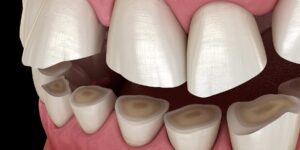
Gum disease is a bacterial infection that results in the inflammation of the gums. It is caused by plaque, which is a combination of food debris and bacteria in the mouth. Plaque builds up on the surface of teeth if it is not removed by regular brushing and flossing.
The bacteria in plaque produces toxins that irritate the gums and results in inflammation which can loosen teeth and allow the bacteria to enter the bloodstream. Thus, gum disease can contribute to the development of conditions such as heart disease, diabetes, premature births, respiratory diseases and dementia.
Heart Disease
Patients with significant oral plaque are more likely to have poor heart health. Scientists believe that gum inflammation leads to an increase of plaque in coronary arteries.
At Dental Health Associates, we recommend that our patients practice good oral hygiene to reduce the inflammation caused by gum disease. This daily home care reduces vascular inflammation caused by bacteria and can lower the risk of heart disease.
Our goal is to help our patients understand the very real connection between oral health and overall wellness and to take the necessary steps to prevent gum disease.
Diabetes
Patients with diabetes are at an increased risk of contracting bodily infections, including gum disease. When bacteria enter the bloodstream, cells in the pancreas are destroyed, which alters the production of insulin and increases blood sugar levels.
It is estimated that one in three diabetics suffer from gum disease at some stage of their diabetes. Higher than normal glucose levels in the body cause higher levels of glucose within the saliva, which creates a fertile breeding ground for bacteria and increases the risk of gum disease.
Premature Births
Research has found that treating gum disease in pregnant women helps them carry their babies to full term. When gum disease is present, gums are more likely to bleed, causing bacteria to enter bloodstream, travel through the mother’s body and enter the placenta which can trigger a premature birth. The bacteria also releases toxins into the mother’s bloodstream that reach the placenta and interfere with fetal development.
Dementia
Gum disease may be linked to memory loss as the bacteria that kick-starts dementia can also cause inflammation of the brain. Cleaning dental plaque can contribute to improvements in dementia patients. In early stages of dementia, a patient may have to be reminded to brush their teeth. As manual dexterity decreases, an electric toothbrush or one with an adapted handle may help with the patient’s independence. In later stages of dementia, a patient may lose the ability to brush their own teeth, at which point a caregiver will need to do it for them to remove plaque.
Respiratory Disease
Bacteria oral inflammation and disease can even affect the respiratory tract. Any bacteria present in the body places a patient at a higher risk for developing pneumonia and other respiratory illnesses due to the bacteria’s effect on the immune system and attack of cell walls.
Prevention
The best way to prevent oral bacteria and gum disease is to brush and floss after every meal and visit a dentist regularly for checkups and cleanings. Following this regimen will improve patients’ oral health and their overall well-being. If you have any questions regarding oral health and gum disease, please contact Dental Health Associates.




